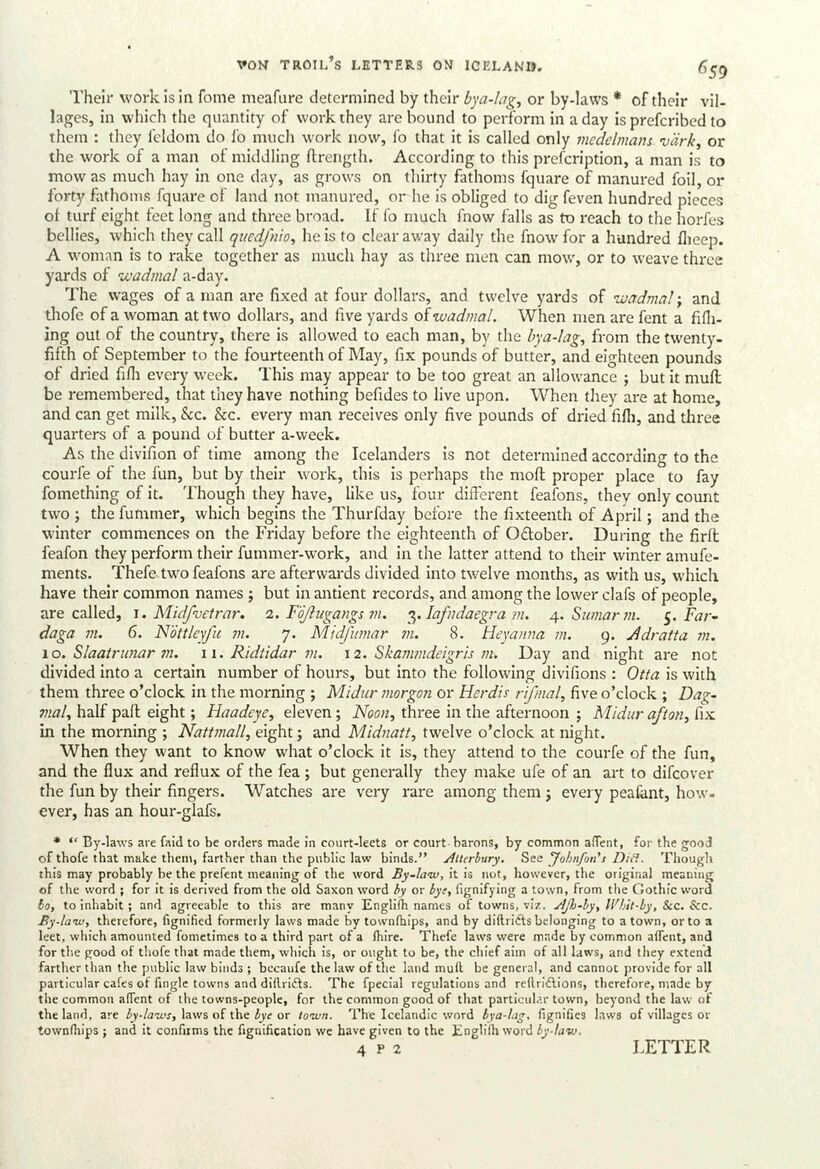
Full resolution (JPEG) - On this page / på denna sida - Pages ...

<< prev. page << föreg. sida << >> nästa sida >> next page >>
Below is the raw OCR text
from the above scanned image.
Do you see an error? Proofread the page now!
Här nedan syns maskintolkade texten från faksimilbilden ovan.
Ser du något fel? Korrekturläs sidan nu!
This page has never been proofread. / Denna sida har aldrig korrekturlästs.
VON TROIL’S LETTERS ON ICELAND. 659
Their work isin fome meafure determined by their bya-/ag, or by-laws * of their vil-
lages, in which the quantity of work they are bound to perform in a day is prefcribed to
them: they feldom do fo much work now, fo that it is called only medelmans vark, or
the work of a man of middling ftrength. According to this prefcription, a man is to
mow as much hay in one day, as grows on thirty fathoms fquare of manured foil, or
forty fathoms fquare of land not manured, or-he is obliged to dig feven hundred pieces
of turf eight feet long and three broad. If fo much fnow falls as to reach to the horfes
bellies, which they call qued/nio, he is to clear away daily the fnow for a hundred fheep.
A woman is to rake together as much hay as three men can mow, or to weave three
yards of wadmal a-day.
The wages of a man are fixed at four dollars, and twelve yards of wadma/; and
thofe of a woman at two dollars, and five yards of wadma/. When men are fent a fith-
ing out of the country, there is allowed to each man, by the dya-/ag, from the twenty-
fifth of September to the fourteenth of May, fix pounds of butter, and eighteen pounds
of dried fifh every week. ‘This may appear to be too great an allowance ; but it muft
be remembered, that they have nothing befides to live upon. When they are at home,
and can get milk, &c. &c. every man receives only five pounds of dried fifh, and three
quarters of a pound of butter a-week.
As the divifion of time among the Icelanders is not determined according to the
courfe of the fun, but by their work, this is perhaps the moft proper place to fay
fomething of it. ‘Though they have, like us, four different feafons, they only count
two; the fummer, which begins the Thurfday before the fixteenth of April; and the
winter commences on the Friday before the eighteenth of O&ober. During the firft
feafon they perform their fummer-work, and in the latter attend to their winter amufe-
ments. ‘Thefe.two feafons are afterwards divided into twelve months, as with us, which
have their common names ; but in antient records, and among the lower clafs of people,
are called, 1. Midfvetrar. 2. Foftugangsm. 3. Iafndaegra m. 4. Sumarm. 4. Fare
daga m. 6. Nottleyft m. 7. Midfumar m. 8. Heyanna m Q. Adratta m.
10, Slaatrunar m. 11. Ridtidar m. 12. Skammdeigris m Day and. night are not
divided into a certain number of hours, but into the following divifions: Ofta is with
them three o’clock in the morning ; Midur morgon or Herdis rifinal, five o’clock ; Dag-
mal, half paft eight ; Haadeye, eleven; Noon, three in the afternoon ; Midur afton, fix
in the morning ; Nattmall, eight; and Midnatt, twelve o’clock at night.
When they want to know what o’clock it is, they attend to the courfe of the fun,
and the flux and reflux of the fea; but generally they make ufe of an art to difcover
the fun by their fingers. Watches are very rare among them; every peafant, how-
ever, has an hour-glafs.
* « By-laws are faid to be orders made in court-leets or court- barons, by common affent, for the good
of thofe that make them, farther than the public law binds.’? Aiterbury. See Fohnfon’s Dié. Though
this may probably be the prefent meaning of the word By-/aw, it is not, however, the original meaning
of the word ; for it is derived from the old Saxon word dy or dye, fignifying a town, from the Gothic word
0, toinhabit; and agreeable to this are many Englifh names of towns, viz. dj/h-by, Whit-by, &c. &c.
By-law, therefore, fignified formerly laws made by townfhips, and by diftri¢ts belonging to a town, orto a
leet, which amounted fometimes toa third part of a fhire. Thefe laws were made by common affent, and
for the good of thofe that made them, which is, or ought to be, the chief aim of all laws, and they extend
farther than the public Jaw binds; becaufe the law of the land muit be general, and cannot provide for all
particular cafes of fingle towns and diftri&s. The {pecial regulations and reflri€tions, therefore, made by
the common affent of the towns-people, for the common good of that particular town, beyond the law of
the land, are dy-/aws, laws of the bye or town. ‘The Icelandic word bya-lag, fignifies laws of villages or
townfhips ; and it confirms the fignification we have given to the Englifh word 4y-law.
4P2 LETTER
<< prev. page << föreg. sida << >> nästa sida >> next page >>